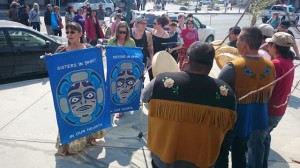Iman Kassam
APTN National News
YELLOWKNIFE –Generations of survivors marched on Yellowknife’s City Hall Sunday to mark the beginning of the end of the Truth and Reconciliation Commission.
They joined thousands of people across the country who walked to celebrate the work done by the commission and to remember the First Nations, Inuit, and Métis children who were forced into residential schools across Canada.
Police shut down Franklin Street in downtown Yellowknife early in the afternoon as marchers erupted into flash drum dances outside the Native Women’s Association.
“Residential schools robbed the children of love and family, language, and culture” said Brenda Norris of the Pauktuutit Inuit Women of Canada, who spoke during the rally. “That abuse insured that generational trauma that is so evident today in our communities continues.”
14 residential schools existed in the Northwest Territories until 1970.
The schools were funded by the federal government and run by Christian churches with the goal of assimilating Indigenous youth and children into a dominant Canadian culture.
Children were taken from their homes, forbidden to speak their ancestral languages, and many suffered physical and sexual abuse.

“And so we wait, patiently, as we always have done for the words ‘we’re worry’ to be turned into concrete action” said Norris.
The healing isn’t over.
“I am a victim, I am also a survivor” said Harold Cook at the Northern United Place in Yellowknife, where marchers gathered at the end of the demonstration.
His parents attended residential school in Aklavik, NWT and he attended residential school at Grollier Hall in Inuvik.
As a child he tried to report that he was sexually assaulted at the school, but he says no one believed him. At the gathering on Sunday, he took to the microphone to share his story.
“The healing process for me has begun. The important thing is to let it go. If you have the heart to forgive the ones who abused me,” said Cook. “And I have a hard time doing it, that’s something I still struggle with.”
Cook spent many years working as a victim’s advocate for survivors.
Now that the TRC’s mandate is over, he wants to see a new treatment center set up in the territory that can help people heal through culture and tradition.
“I wish we had this kind of support when we were going to trial” he said, looking across the room of intergenerational survivors and allies. “I’m on my own healing journey, I’m celebrating 38 years of sobriety.”









